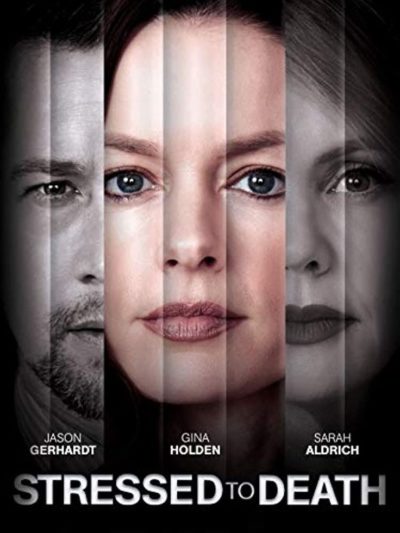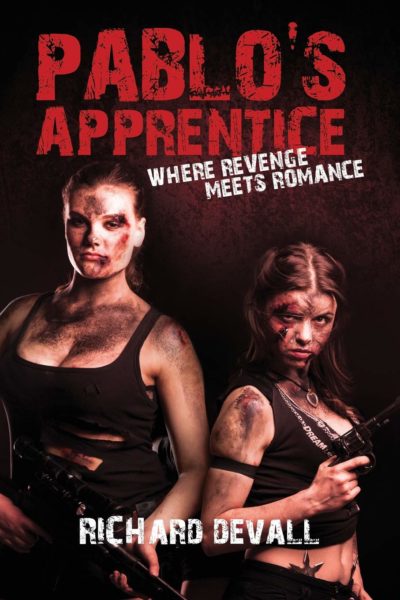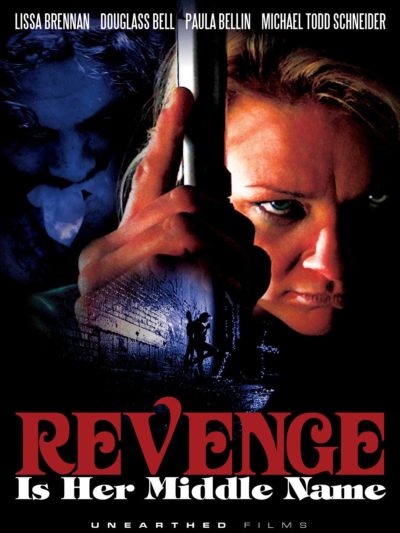★★
“When doves cry.”
 I am contractually obliged to appreciate at least somewhat, any film made here in Arizona. This certainly fits the bill, having been shot at places like the Pioneer Living History Museum, Sitgreaves National Forest and Winters Film Group Studio. However, it is a fairly basic tale of two-pronged revenge, with significant pacing issues. The proceedings only come to life in the last 20 minutes – and barely that. Initially, matters are more than a tad confusing, as we jump about in time and space without apparent notification. But the basic principal is eventually established.
I am contractually obliged to appreciate at least somewhat, any film made here in Arizona. This certainly fits the bill, having been shot at places like the Pioneer Living History Museum, Sitgreaves National Forest and Winters Film Group Studio. However, it is a fairly basic tale of two-pronged revenge, with significant pacing issues. The proceedings only come to life in the last 20 minutes – and barely that. Initially, matters are more than a tad confusing, as we jump about in time and space without apparent notification. But the basic principal is eventually established.
Revenger #1 is Regina Silva (Martin), whose family were killed by masked intruders. Following that, she got shooting lessons from a conveniently passing gunslinger, and set out to find those responsible, working as a saloon prostitute because it was apparently the best way to find them. Yeah. About that… Anyway, Revenger #2 is Victoria Bonham (Penny), who just so happens to be the madam of a brothel, also seeking justice after one of her girls was murdered. Coincidentally, Regina shows up, and they eventually discover they are both looking for the same person, Pete Chalmers (Johnston). However, his father (Greenfield) wields so much power in the town, his son is basically untouchable. Victoria wants to leverage legal means against Pete, while Regina prefers more direct action, and isn’t willing to wait around forever, while the wheels of the law grind slowly away.
If you were to summarize my reactions to this, the first ten minutes would be “What is going on?”. The next twenty would likely be, “Ah, ok. I know where this is heading.” After that, we get about half an hour of, “Is anything else of significance going to happen?”, then twenty of moderate satisfaction, as Chalmers and his forces go to battle with Regina and her allies. However, the action here is underwhelming, not least because it appears the bad guys have all the shooting skills of Star Wars stormtroopers, unable to hit stationary targets from about ten paces, in broad daylight (as shown, top). Pete is an underwhelming villain too: beyond “alcohol’s to blame,” it’s never particularly established why he attacked Regina’s family or killed Victoria’s employee. Motivation: it’s vastly over-rated, apparently.
The last five minutes do offer at least something unexpected, in terms of the mechanism by which revenge is achieved. It’s about the only novel angle the film has to offer, and you sense this is one of those cases where having the same person writing, editing and directing proved problematic. I’m not convinced the story can handle the two-pronged approach, with the script leaving both threads feeling in need of development.The dual female leads aren’t bad, though I was distracted by Penny’s accent, which sounds more Antipodean than Arizona. To be fair, it’s really not any worse than Bad Girls, the far larger budgeted “whores out for revenge” film. However, that is not exactly a high bar to clear. For passion projects like this, I have no problem forgiving budgetary restrictions, and to be fair, this looks and sounds decent. The plodding and meandering script, however, is much harder to see past.
Dir: Paul Winters
Star: Sandy Penny, Jessica Y. Martin, Manny Greenfield, Daniel Johnston
A version of this review originally appeared on my other review site, Film Blitz.





 I’ve previously talked about – OK, “ranted” may not be inappropriate – the perils of message movies. But I did wonder whether it was the specific content to which I objected. Would I dislike a film so much, if I was on board with its strident message? On the evidence here, I can confidently state: hell, yes. For this is painfully earnest and hard to watch, much though I agree with the environmental topic, that humanity’s use of plastics are threatening the oceans. An alternative needs to be found. By which I mean, I strongly suggest you find an alternative to watching this movie. The poster has clearly strayed in from a far more entertaining offering, and bears little resemblance to what this provides.
I’ve previously talked about – OK, “ranted” may not be inappropriate – the perils of message movies. But I did wonder whether it was the specific content to which I objected. Would I dislike a film so much, if I was on board with its strident message? On the evidence here, I can confidently state: hell, yes. For this is painfully earnest and hard to watch, much though I agree with the environmental topic, that humanity’s use of plastics are threatening the oceans. An alternative needs to be found. By which I mean, I strongly suggest you find an alternative to watching this movie. The poster has clearly strayed in from a far more entertaining offering, and bears little resemblance to what this provides.  The concept here is intriguing. It’s just the execution – and the script in particular – which is bad. A robbery at a convenience store ends in the death of David, the husband to Victoria Garrett (Aldrich). She blames the paramedic on the scene, former soldier Maggie Hart (Holden), for the loss of her spouse, though the incident hits Maggie equally hard. She quits her job, raising daughter Jane (Blackwell) with her husband, commercial real-estate agent, Jason (Gerhardt). But Victoria hasn’t moved on – in probably the film’s most memorably loopy elements, she feeds her husband’s ashes to a pot-plant she calls David, to which she chats. She’s also clearly a believer in that saying about revenge being served cold.
The concept here is intriguing. It’s just the execution – and the script in particular – which is bad. A robbery at a convenience store ends in the death of David, the husband to Victoria Garrett (Aldrich). She blames the paramedic on the scene, former soldier Maggie Hart (Holden), for the loss of her spouse, though the incident hits Maggie equally hard. She quits her job, raising daughter Jane (Blackwell) with her husband, commercial real-estate agent, Jason (Gerhardt). But Victoria hasn’t moved on – in probably the film’s most memorably loopy elements, she feeds her husband’s ashes to a pot-plant she calls David, to which she chats. She’s also clearly a believer in that saying about revenge being served cold.
 This is certainly an odd animal. It takes place in and around a Thailand hospital, where one of the physicians, Dr. Tar (Jarujinda), has a lucrative side-scam in selling bodies to… well, if it’s not clear who, there appears to be sufficient demand for them. He is in cahoots with a group of seven nurses, but one of them, his girlfriend Tahwaan (Wachananont), finds out he is having an affair with her sister, Nook (Rujiphan). After she threatens to go to the police, Dr. Tar and the other six nurses kidnap and kill Tahwaan. However, her spirit comes back from the grave, to take brutal vengeance on those responsible for her death. Naturally, the peeved ghost starts with the characters who bore relatively minor culpability, working her way up to Nook and the not-so-good doctor.
This is certainly an odd animal. It takes place in and around a Thailand hospital, where one of the physicians, Dr. Tar (Jarujinda), has a lucrative side-scam in selling bodies to… well, if it’s not clear who, there appears to be sufficient demand for them. He is in cahoots with a group of seven nurses, but one of them, his girlfriend Tahwaan (Wachananont), finds out he is having an affair with her sister, Nook (Rujiphan). After she threatens to go to the police, Dr. Tar and the other six nurses kidnap and kill Tahwaan. However, her spirit comes back from the grave, to take brutal vengeance on those responsible for her death. Naturally, the peeved ghost starts with the characters who bore relatively minor culpability, working her way up to Nook and the not-so-good doctor. I will say, I did actually enjoy this rather more than the rating above indicates. For pure entertainment value, it’s a 3 to 3½-star entity, when watched as a brutal parody of new feminism. The problem is, I don’t think those involved with it were making a parody. As a serious statement about gender, it’s almost impossible to take seriously. Alexandra Nelson (Cotter) is at the end of her tether, when she gets a call that her long-estranged mother is dying. Driving home to pick up the body, she finds it being hustled out the back of the crematorium. Turns out to be part of an organ harvesting scheme, run by the local crime bosses. This gives Alex something to live for, and she begins a one-woman campaign to take down the perpetrators. But that’s a mission which will drag in her estranged sister, bikini barista Jenny (Gately), into peril as Alex’s targets respond to her actions.
I will say, I did actually enjoy this rather more than the rating above indicates. For pure entertainment value, it’s a 3 to 3½-star entity, when watched as a brutal parody of new feminism. The problem is, I don’t think those involved with it were making a parody. As a serious statement about gender, it’s almost impossible to take seriously. Alexandra Nelson (Cotter) is at the end of her tether, when she gets a call that her long-estranged mother is dying. Driving home to pick up the body, she finds it being hustled out the back of the crematorium. Turns out to be part of an organ harvesting scheme, run by the local crime bosses. This gives Alex something to live for, and she begins a one-woman campaign to take down the perpetrators. But that’s a mission which will drag in her estranged sister, bikini barista Jenny (Gately), into peril as Alex’s targets respond to her actions.
 There’s a decent idea here, and an attempt to add some new wrinkles to that old reliable, the rape-revenge genre. Unfortunately, there are too many problems and missteps to make this a worthwhile entry. Violet (Winkler) is an aspiring actress, whose dreams are shattered when she falls for a fake audition. She is lured into a basement, raped, and the resulting footage posted on a highly-dubious website. She’s clearly broken by the trauma, to the increasing worry of her mother (Burns). But hope is present in her growing relationship with Josh (Crowe), a young man she met at the lake where Violet likes to sit, trying to find some measure of peace. However, how will he react when he finds out about her other life, in which she is making those responsible for the assault, pay.
There’s a decent idea here, and an attempt to add some new wrinkles to that old reliable, the rape-revenge genre. Unfortunately, there are too many problems and missteps to make this a worthwhile entry. Violet (Winkler) is an aspiring actress, whose dreams are shattered when she falls for a fake audition. She is lured into a basement, raped, and the resulting footage posted on a highly-dubious website. She’s clearly broken by the trauma, to the increasing worry of her mother (Burns). But hope is present in her growing relationship with Josh (Crowe), a young man she met at the lake where Violet likes to sit, trying to find some measure of peace. However, how will he react when he finds out about her other life, in which she is making those responsible for the assault, pay. Bea is living a quiet life, far out in the Wyoming countryside, with her husband Justin and young son, Bear. However, this isolation is an entirely deliberate choice in order to escape from her past. For in her previous life, she was Phoenix Romano, an enforcer and hit-woman for her mob boss father. After deciding she’d had enough of that life, she liberated several millions of his money, and vanished, hoping never to be found again. Naturally, things don’t quite work out like that. Justin and Bear are killed in a car crash, but Phoenix has reason to suspect it wasn’t an accident, and that instead her past life is catching up with her. But why did whoever was responsible for that go after her family, and leave her alive?
Bea is living a quiet life, far out in the Wyoming countryside, with her husband Justin and young son, Bear. However, this isolation is an entirely deliberate choice in order to escape from her past. For in her previous life, she was Phoenix Romano, an enforcer and hit-woman for her mob boss father. After deciding she’d had enough of that life, she liberated several millions of his money, and vanished, hoping never to be found again. Naturally, things don’t quite work out like that. Justin and Bear are killed in a car crash, but Phoenix has reason to suspect it wasn’t an accident, and that instead her past life is catching up with her. But why did whoever was responsible for that go after her family, and leave her alive?